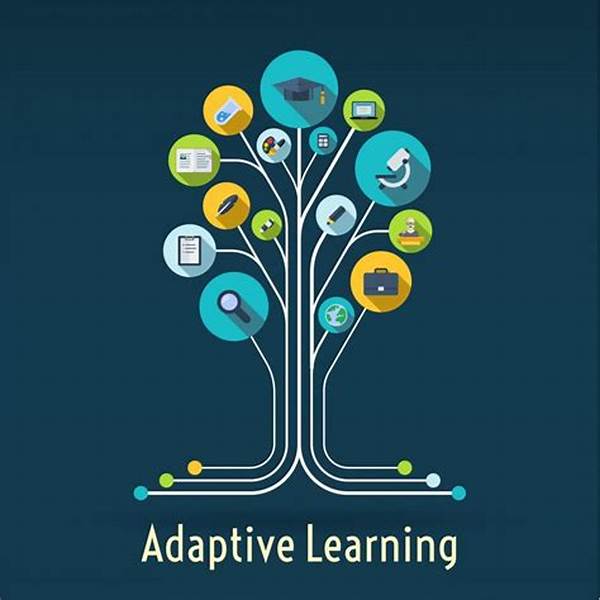The Evolution of Adaptive Learning Technologies
Adaptive learning technologies represent a significant shift in the educational landscape, offering a more personalized approach to student learning. These technologies are designed to tailor educational experiences to the individual needs of learners, thus maximizing the potential for educational attainment. By assessing a student’s performance in real-time, adaptive learning systems make it possible to identify strengths and weaknesses, providing targeted support to bolster understanding and comprehension.
Read Now : Coding Challenges In Real-world Scenarios
Historically, education has largely followed a one-size-fits-all approach, which often fails to address the unique learning paces and styles of individual students. Adaptive learning technologies aim to fill this gap by employing sophisticated data analytics and algorithms to create customized learning paths for each student. As such, these technologies not only enhance engagement but also improve learning outcomes by ensuring that each student receives the necessary support to succeed.
Moreover, the integration of adaptive learning technologies provides educators with invaluable insights into student performance and progress. Such data-driven insights aid instructors in refining their teaching strategies, thereby fostering an environment conducive to academic excellence. As educational institutions continue to embrace technological advancements, the role of adaptive learning technologies is anticipated to grow, further revolutionizing the way education is delivered.
Key Features of Adaptive Learning Technologies
1. Personalized Learning Experience: Adaptive learning technologies offer a personalized learning path tailored to each student’s individual needs, preferences, and learning pace. By analyzing user data, these technologies can provide targeted content and exercises.
2. Real-Time Feedback and Assessment: Adaptive learning technologies deliver real-time feedback and assessments, allowing both learners and educators to monitor progress and address learning gaps promptly.
3. Data-Driven Insights: Through data analytics, adaptive learning systems provide insights into student performance, helping educators to adjust instructional strategies and optimize the learning experience.
4. Scalability and Flexibility: These technologies can be easily scaled to accommodate a large number of students, making them suitable for diverse educational settings ranging from K-12 to higher education.
5. Enhanced Engagement: By tailoring content to students’ interests and learning levels, adaptive learning technologies increase student engagement and motivation, leading to improved educational outcomes.
Implementing Adaptive Learning Technologies in Education
Integrating adaptive learning technologies into educational settings involves the strategic deployment of sophisticated algorithms capable of analyzing vast amounts of data. These systems detect patterns in student interactions and adjust the instructional content accordingly. The goal is to ensure that each learner receives a unique educational experience that aligns with their cognitive abilities and preferences.
However, the implementation of adaptive learning technologies requires careful planning and consideration of various factors, including technological infrastructure and teacher training. Educators must be equipped with the necessary skills to interpret data and apply insights effectively. Additionally, ongoing support and evaluation are crucial to adapt these systems to changing educational demands and ensure their successful incorporation into the curriculum.
The Benefits of Adaptive Learning Technologies
1. Personalization to individual learning needs
2. Improved engagement and motivation
3. Real-time performance monitoring
4. Effective identification of knowledge gaps
5. Support for diverse learning environments
6. Enhanced teacher insight and strategy refinement
Read Now : Cost-effective Homework Help Online
7. Scalability for large student populations
8. Flexibility in content delivery
9. Promotion of self-paced learning
10. Efficient resource allocation
11. Facilitation of differentiated instruction
12. Improvement in overall academic outcomes
Addressing Challenges in Adaptive Learning Technologies
Adaptive learning technologies, while beneficial, present specific challenges that necessitate careful consideration. Implementing these systems requires substantial investment in terms of time and financial resources, given the need for advanced technological infrastructure and ongoing maintenance. Moreover, educators must undergo specialized training to interpret and leverage data effectively, ensuring alignment with pedagogical objectives.
Privacy concerns regarding data collection and security also arise, necessitating robust protocols to protect student information. Institutions must address these issues to ensure compliance with legal and ethical standards. Furthermore, adapting curricula to integrate adaptive learning technologies requires a collaborative approach involving educators, administrators, and technology providers.
Future Prospects of Adaptive Learning Technologies
The future of adaptive learning technologies looks promising, with potential to further transform educational practices. As technology continues to evolve, these systems are expected to become increasingly sophisticated, offering even more precise personalization and support. Artificial intelligence advancements will likely augment the capabilities of adaptive learning, enabling more nuanced and effective educational interventions.
As educational institutions recognize the advantages of adaptive learning technologies, their adoption is poised to expand across various levels of education. This expansion will necessitate ongoing research and development to ensure these technologies meet the evolving needs of learners and educators alike, ultimately fostering a more inclusive and efficient educational environment.
Conclusion
Adaptive learning technologies represent a groundbreaking advancement in educational methodologies, offering a tailored, data-driven approach to learning. These technologies cater to individual learning styles, delivering personalized educational experiences that promote student engagement and improve academic performance. By harnessing data analytics, adaptive learning systems provide educators with valuable insights into student progress, enabling data-informed instructional strategies that enhance the overall learning experience.
As the educational paradigm shifts towards more personalized and efficient learning solutions, adaptive learning technologies are destined to play a pivotal role in shaping the future of education. However, successful implementation necessitates addressing challenges related to infrastructure, training, and data privacy, ensuring that these technologies are integrated seamlessly into the curriculum. The potential for continued innovation in this domain suggests that adaptive learning technologies will become an indispensable component in the quest for optimal educational outcomes.
